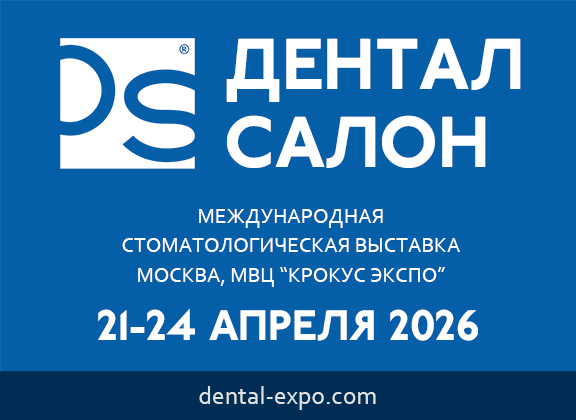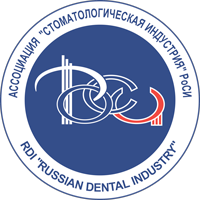DOI:
10.37988/1811-153X_2022_2_50Boron and Dimephosphon efficacy of peri-implantitis therapy according to bone mineral density, mineral metabolism, and bone remodeling markers
Downloads
Abstract
Peri-implantitis is an inflammatory process in the gingival cuff area and in a limited area of the implant/bone tissue, which is caused by a wide range of unfavorable factors. There are many described methods of prevention of complications after dental implantation and methods of surgical and non-surgical treatment, but a universal approach, guaranteeing the success of the cure, has not yet been found. Dimephosphone and boron medications use and their combination may become a promising way for prevention and treatment of peri-implantitis.Materials and methods.
The study involved 120 participants (66 women and 54 men from 30 to 60 years old) having diagnosed “peri-implantitis” divided into 4 equal groups by the treatment way: no treatment (control), intake of organic boron as calcium borogluconate (group I), treatment with dimefosphone (group II) and the combined use of boron and dimefosphone (group III). Bone mineral density (BMD) was measured before and after treatment by ultrasound densitometer, mineral metabolism parameters (Ca, Mg, P) and bone tissue remodeling markers (β-CTX, TSF, sRANKL, OPG and sclerostin) were determined.
Results.
Before treatment the proportion of patients with physiological level of BMD in the studied groups ranged from 35.0 to 47.5%; with reduced BMD - from 42.5 to 57.5%, and with significant reduction of BMD - from 5 to 10%. After treatment percentage of patients had physiological level of BMD varied from 37.5 to 52.5%; with reduced BMD - from 42.5 to 57.5%, and with significant reduction of BMD - from 2.5 to 7.5%. Calcium concentration in Group I increased by 5.15%, magnesium by 19.2%, and phosphorus by 12.6% over 30 days of treatment. In group II the calcium concentration changed insignificantly, while magnesium and phosphorus increased by 6.8% and 7.1%, respectively. Complex therapy with boron and demiphosphon in group III led to increasing of calcium concentration in plasma by 7.8%, magnesium - by 25.9%, phosphorus - by 23.9%. Regarding the markers of bone remodeling in the blood plasma of the patients before and after 30 days of peri-implantitis therapy the similar tendency was observed.
Conclusions.
Therapy with boron, dimephosphon and complex application of boron and dimephosphon preparations contribute to normalization of bone tissue mineral density, mineral exchange and markers of bone remodeling and the complex therapy is the most effective.
Key words:
peri-implantitis, ultrasonometry, bone mineral density, mineral metabolism, remodeling markersFor Citation
[1]
Shumskij A.V., Kizim A.N., Pavlova O.N., Gulenko O.N. Boron and Dimephosphon efficacy of peri-implantitis therapy according to bone mineral density, mineral metabolism, and bone remodeling markers. Clinical Dentistry (Russia). 2022; 25 (2): 50—56. DOI: 10.37988/1811-153X_2022_2_50
References
- Gudaryan A.A., Shirinkin S.V. Results of complex treatment of dental periimplantitis. Sciences of Europe. 2016; 9—2 (9): 38—44 (In Russ.). eLIBRARY ID: 27866931
- Arkhipov A.V. Implant-retained restoration in esthetically important zone. Stomatology. 2013; 1: 63—65 (In Russ.). eLIBRARY ID: 18876287
- Yarov Y.Y., Sílenko Y.I., Dvornik V.N., Kuts P.V. Supportive treatment after dental implantation. Ukrainian Dental Almanac. 2014; 5: 71—74 (In Russ.). eLIBRARY ID: 23106576
- Armas J., Culshaw S., Savarrio L. Treatment of peri-implant diseases: a review of the literature and protocol proposal. Dent Update. 2013; 40 (6): 472—4, 476—8, 480. PMID: 23971346
- Górska R., Gregorek H., Kowalski J., Laskus-Perendyk A., Syczewska M., Madaliński K. Relationship between clinical parameters and cytokine profiles in inflamed gingival tissue and serum samples from patients with chronic periodontitis. J Clin Periodontol. 2003; 30 (12): 1046—52. PMID: 15002890
- Akhmedov G.D., Tsareva T.V. Antioxidant therapy by infectious complication of oral surgery procedures. Stomatology. 2012; 4: 36—37 (In Russ.). eLIBRARY ID: 18022675
- Acquier A.B., De Couto Pita A.K., Busch L., Sánchez G.A. Parameters of oxidative stress in saliva from patients with aggressive and chronic periodontitis. Redox Rep. 2017; 22 (3): 119—126. PMID: 27320473
- Bobkova I.L. The role of a periodontist in the prevention of periimplant lesions in patients with chronic generalized periodontitis. In: proceedings of the “Modern technology in medical education”. Minsk, 2021. Pp. 1105—1108. (In Russ.). eLIBRARY ID: 47356821
- Vantsyan A.V. Complex immunoprophylaxis of complications in dental implantation using ultrasound: dissertation. Moscow, 2008. 141 p. (In Russ.).
- Shchnayder S.A., Prudius A.G. Clinical assessment of the condition of the mucous membrane of the oral cavity in a zone of implantation in the postoperative period of dental implantation at healthy persons. Bulletin of Dentistry. 2015; 1 (90): 73—75 (In Russ.). eLIBRARY ID: 25933516
- Garayev Z.I., Javadov R.A., Nasirova X.B. Reduction of the risk of complication at the dental implantation. Sovremennaya stomatologiya (Belarus). 2014; 2 (59): 74—76 (In Russ.). eLIBRARY ID: 22364098
- Gudaryan A.A., Shirinkin S.V. Clinical, morphological and immunological criteria for the reversibility of the inflammatory process in the peri-implantation area. Ukrainian Dental Almanac. 2014; 1: 76—82 (In Russ.). eLIBRARY ID: 23222083
- Latyushina L.S., Piotrovich A.V., Malysheva L.J., Artyukhevich T.V., Kuzmina E.V. Immunological features of the development early form periimplants and the topical immunotherapy effect on the salivator level cytokines during dental implantation. Russian Journal of Immunology. 2019; 3: 1211—1216 (In Russ.). eLIBRARY ID: 46646307
- Ippolitov E.V., Ilyasova S.T., Akhmedov G.J., Arutyunyan A.V., Tsarev V.N. Clinical and immunological monitoring of gingival fluid cytokines in patients with perimplantitis during photodynamic therapy. Medical alphabet. 2020; 12: 15—18 (In Russ.). eLIBRARY ID: 44085524
- Valeeva I.H., Ziganshina L.E., Galyautdinova A.Y., Samoylova N.S., Burnashova Z.A. Comparative study of the effectiveness of Dimephosphon and Ximedon in steroid osteoporosis in rats. Experimental and Clinical Pharmacology. 2000; 6: 39—42 (In Russ.). eLIBRARY ID: 43920764
- Titarenko A.F., Khaziakhmetova V.N., Valeeva I.Kh., Ziganshina L.E. Dimephosphone Shows Anti-Inflammatory and Anti-Oxidative Activity on Chronic Autoimmune Inflammation Model. Experimental and Clinical Pharmacology. 2011; 3: 13—16 (In Russ.). eLIBRARY ID: 23186241
- Vereshchagina V.S. Study of some aspects of the mechanism of antiarrhythmic action of dimephosphon and mexidol: master’s thesis abstract. Moscow, 2002. 22 p. (In Russ.).
- Poluektov M.G., Podymova I.G., Golubev V.L. Potentials of using Dimephosphone in neurology and neurosurgery. Doctor.Ru. 2015; 5—6 (106—107): 5—10. (In Russ.). eLIBRARY ID: 24071035
- Valeeva I.Kh., Ziganshina L.E., Burnashova Z.A., Ziganshin A.U. Dimephosphon and xydiphone influence the mineral metabolism and lipid peroxidation in rats upon prolonged chronic administration of prednisolone. Experimental and Clinical Pharmacology. 2003; 1: 46—49. (In Russ.). eLIBRARY ID: 22391367
- Shuvalova E.N., Balashov V.P., P.P. Krugljakov, Poderov V.N. Some aspects of pharmacotoxicology of ethacisine and dimephosphone. I.P. Pavlov Russian Medical Biological Herald. 2003; 1—2: 122—125. (In Russ.). eLIBRARY ID: 9321000
- Khitrov N.A., Berestovaya N.A. Bora Bora therapy for osteoporosis. Modern Rheumatology Journal. 2009; 1: 36—41. (In Russ.). eLIBRARY ID: 13121681
- Doğan A., Demirci S., Apdik H., Bayrak O.F., Gulluoglu S., Tuysuz E.C., Gusev O., Rizvanov A.A., Nikerel E., Şahin F. A new hope for obesity management: Boron inhibits adipogenesis in progenitor cells through the Wnt/β-catenin pathway. Metabolism. 2017; 69: 130—142. PMID: 28285642
- Popova E.V., Tinkov A.A., Ajsuvakova O.P., Skalnaya M.G., Skalny A.V. Boron A potential goiterogen? Med Hypotheses. 2017; 104: 63—67. PMID: 28673593
- Mahabir S., Spitz M.R., Barrera S.L., Dong Y.Q., Eastham C., Forman M.R. Dietary boron and hormone replacement therapy as risk factors for lung cancer in women. Am J Epidemiol. 2008; 167 (9): 1070—80. PMID: 18343880
- Sheng M.H., Taper L.J., Veit H., Thomas E.A., Ritchey S.J., Lau K.H. Dietary boron supplementation enhances the effects of estrogen on bone mineral balance in ovariectomized rats. Biol Trace Elem Res. 2001; 81 (1): 29—45. PMID: 11508330
- Rashidi F. Clinical and metabolic criteria of dental perimplantitis. Applied and IT Research in Medicine. 2009; 1: 68—70 (In Russ.). eLIBRARY ID: 22572367
- Avanesyan R.A., Sirak S.V., Khojayan A.B., Gevandova M.G., Kopylova I.A. Sociological aspects of diagnosis and prevention of complications of dental implantation (based on survey of physicians, dentists). Fundamental research. 2013; 7—3: 495—499 (In Russ.). eLIBRARY ID: 19693279
- Tlustenko E.S. Clinical and metabolic criteria for dental peri-implantitis: dissertation abstract. Samara: Samara State Medical University, 2004. 22 p. (In Russ.).
- Hyshiktyev B.S., Ostrovskay V.F. The dimephosphonum influence on the hemodynamics indices in the process of treatment of the averege degree of chronical generalized parodontitis in elderly people. Siberian medical journal (Irkutsk). 2007; 4: 87—90 (In Russ.). eLIBRARY ID: 18052941
- Schwarz F., Becker J. Peri-implant infection: etiology, diagnosis and treatment. Quintessence, 2009. Pp. 4—40.
Downloads
Received
March 23, 2022
Accepted
May 26, 2022
Published on
June 1, 2022










